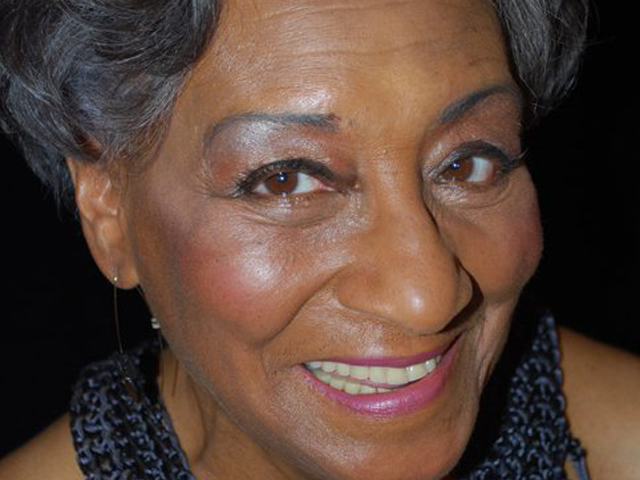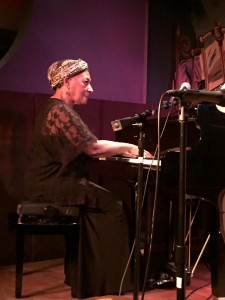Bertha Hope has been surrounded by music all her life. Her father Clinton (Henry) Rosemond was a dramatic baritone singer who traveled all over Europe to perform, she married two legendary jazz musicians – pianist, Elmo Hope and bassist, Walter Booker, and she herself became an award-winning jazz pianist.
In late 2014, after a full career touring Europe and Japan and playing with a diverse group of artists, Hope was named a Living Legend by the Bronx Music Heritage Center at age 78.
Originally from Los Angeles, she has lived in New York City since she moved there with her husband Elmo in 1961. She says her first husband was one of her biggest musical influences, and they met while he was touring in LA.
“I was trying to learn his music, as I was beginning to be interested in the Be Bop era – listening to Billy Holiday and modern jazz quartets,” remembers Hope. “I had a good ear. That’s what I was doing with Elmo’s music, and I was trying to impress him without seeming too school girlish.”
Sadly, Elmo died from heart failure when he was 43 and Bertha was 31. They had three children, and their daughter, Monica, became a singer.
“Being able to talk the same language was wonderful,” says Hope about her marriage. “I was in awe of Elmo. For a long time, I didn’t let him hear me play. I would practice when he wasn’t home. Eventually, we did play together and did an LP. We sometimes went to practice together, but I was always nervous and a wreck.”
She says Bud Powell’s style was also a big influence on her in the beginning, as well as Duke Ellington, and later, Mary Lou Williams. Hope says there have always been women musicians, as long as she can remember, because of the “church influence.”
“Blues and church music have very similar elements,” says Hope, explaining it was most common for women to play the piano. “When I was growing up, I met one woman who played the saxophone in LA…I wanted to play the trumpet, but my mom said it was too masculine.”
So she ended up dabbling with the violin, cello and clarinet, but sticking to the piano, because she says those instruments were acceptable at the time for girls. She sometimes regrets not pursuing the trumpet, however.
“I wasn’t aggressive enough to pursue another instrument,” says Hope. “I wasn’t brave enough to persist.”
She says she was around 12 or 13, however, when she was certain she wanted to be a musician for her life’s career.
“I come from a musical family. I took lessons starting at 3, and in a great public school in Los Angeles, I was exposed to instruments at a very early age,” says Hope. “The first time I realized it was what I wanted to do was when my father asked to help vocalize him. He hired me at age 12. That was my first salary – $7 for the concert. I hardly make that much now.” (laughing)
She says one of her all-time favorite accomplishments in her career was putting the band Jazzberry Jam! together in the late 1970’s. The four-woman band has played at New York City’s Gracie Mansion, The Brooklyn Academy of Music, The Renaissance Jazz Festival in Indianapolis, and was featured in a 1999 award-winning documentary, “Les Femmes du Jazz.”
“[Forming the band] helped us turn the corner of being a band that worked occasionally to a band that played a lot,” says Hope. “We performed at The West End for eight weeks straight. The people that came to support was mostly musician’s wives, and we still perform today. “
Hope is currently in residency at NYC jazz club, Minton’s, where she plays with the Minton Players every other weekend.
If she could tell her younger self one piece of advice about life, with the wisdom she has now, what would it be?
“Stay in school, and stay open. Stay focused. Listen more than you talk. Take in a wide amount of musical experiences, and stay true to yourself. Find people that do the best of what it is you want to do, and try to learn from their experiences.”


Pingback: Daughter of jazz legend, Bertha Hope, remembers her mom’s influence | Wiser With Age